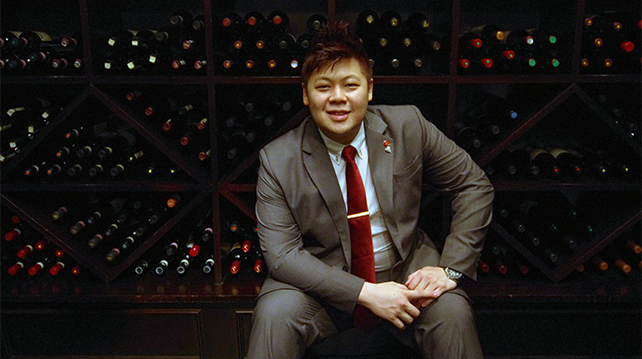Thirsty Malaysians Series – Malaysia Overseas
Malaysian Sommelier Abroad: Why I Left to Pursue My Wine Career in Europe
I never understood why anyone would pay RM2,000 for a bottle of wine. Coming from a hospitality background, I could easily tell the difference between a premium and a cheap cut of beef. But wine? That changed during my internship with Restaurant Le Francais in 2004.
One day, the restaurant manager, Max Chong, pulled out two bottles from the fridge – a Burgundy and a Bordeaux. He poured each into a separate glass and asked me to compare them. I examined the wines, took a sip, and said, “The Burgundy looks lighter, like it’s been watered down. The Bordeaux is darker and more flavourful – must be the expensive one.”
Max didn’t have to say a word. His expression said it all: the Burgundy was ten times more expensive than the Bordeaux. That moment, followed by my first wine book handed to me by Max, opened the door to the world of wine.
I became obsessed. I devoured books, wrote my first thesis comparing Bordeaux and Burgundy, and a second one analysing Malaysian wine consumption – both for my Hospitality & Tourism degree at Université de Toulouse in France.
Many people romanticise the life of a sommelier. They imagine someone who opens bottles, sips wine, and chats with guests. The reality is far more complex. A true sommelier is part hospitality expert, part beverage consultant, part business strategist. We deal with logistics, inventory, budgeting, purchasing, and even investment planning – all of which contribute to building a successful restaurant.
When I left Malaysia in 2012, my goal was to deepen my knowledge and grow as a sommelier. I first tried to develop my career locally and was an active member of the Sommelier Association of Malaysia (SOMLAY). Back then, SOMLAY was run by sommeliers who weren’t tied to wine businesses – it was a neutral, independent space for professional growth.
But I quickly realised that Malaysia didn’t offer the environment needed for sommeliers to evolve beyond theory. Why? Two reasons: culture, and a lack of seasonal awareness in dining.
Drinking Culture Differences
In Europe, drinking is woven into the dining ritual. Meals begin with an aperitif, followed by beverage pairings for each course, ending with a digestif or tea. It’s not just about wine – it’s about pacing, pairing, and pleasure.
In contrast, dining in Malaysia tends to revolve around speed and sharing. Food arrives all at once, dishes are hot and communal, and drinks, if ordered, are few. Alcohol is often consumed in bulk (buckets of beer, shared bottles of spirits), and wine is rarely paired by the course.
There’s also a cultural perception that alcohol is indulgent, even sinful, rather than a lifestyle. Europeans drink openly, any time of day. In Malaysia, alcohol consumption is often hidden or limited to nightlife.
The Lost Joy of Seasons
Then there’s the issue of seasonal dining. In Finland, glögi (mulled wine) appears only in winter. Autumn brings game like grouse and quail. Each season brings fresh flavours, and fresh inspiration.
In Malaysia, seasonal produce has lost its charm. Durian, once a once-a-year treat, is now available year-round. Same goes for mooncakes, rice dumplings, and other cultural specialties. When everything is available all the time, nothing feels special anymore. Menus become predictable, and the excitement of the changing seasons, and the food that comes with them, fades.
I miss Malaysia every day – the mamak stalls, the teh tarik, the people. No one wants to leave their home, family, and friends behind. But for sommeliers, Malaysia has yet to become a nurturing ground for growth on par with countries that have an ingrained culture of alcohol and fine dining.
The State of SOMLAY and the Future of Malaysian Sommeliers
Back when SOMLAY was at its peak (2009–2012), Malaysian sommeliers dominated Southeast Asia. I’m proud to have won the title of South East Asia Best Sommelier in 2012. Back then, calling yourself a Malaysian sommelier meant something. It came with weight and credibility.
Today, things have changed. SOMLAY is no longer entirely independent, with some members involved in the wine business. That neutrality, the thing that once made it a platform for collective growth, is now compromised.
So before calling yourself a sommelier, ask yourself: Are you truly committed to the craft? Or is it just a title that sounds impressive?
--
Edmund Liew was born and raised in Kajang. At 30, he was the Wine Director of the Pariisin Ville group in Porvoo, Finland. The group includes two restaurants – Sicapelle, known for casual fine dining with a Nordic-Italian touch, and Meat District, focused on organic produce – as well as two cafés and two hotels. Edmund was previously Head Sommelier at Ravintola Sinne, listed in the White Guide Nordic’s Top 40 Best Restaurants in 2016. He was crowned Champion in the South East Asia Best Sommelier Competition 2012.
